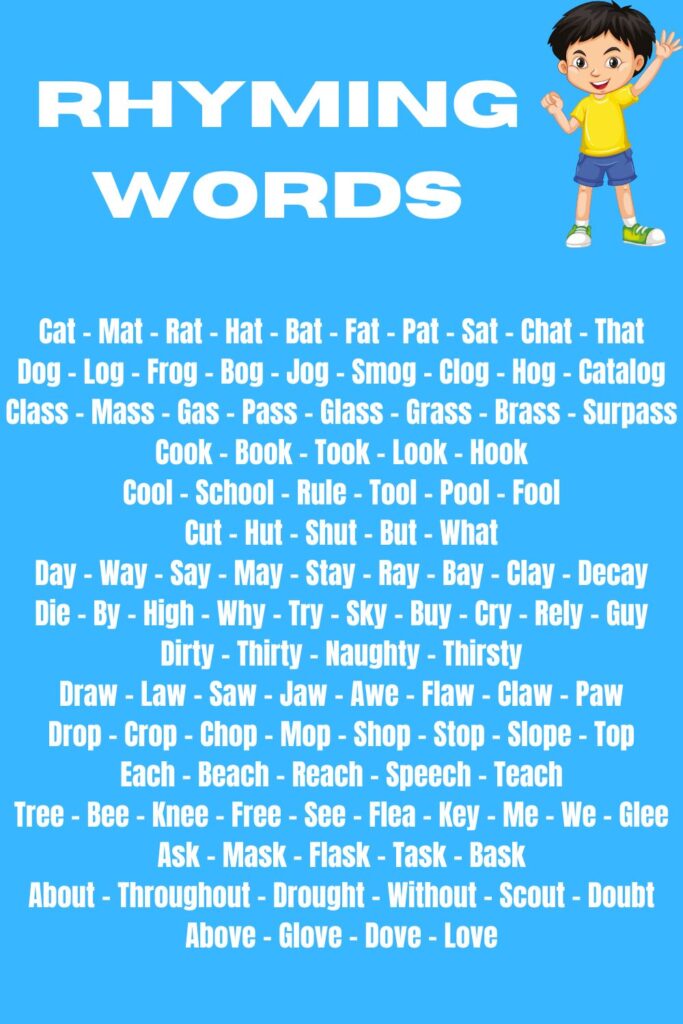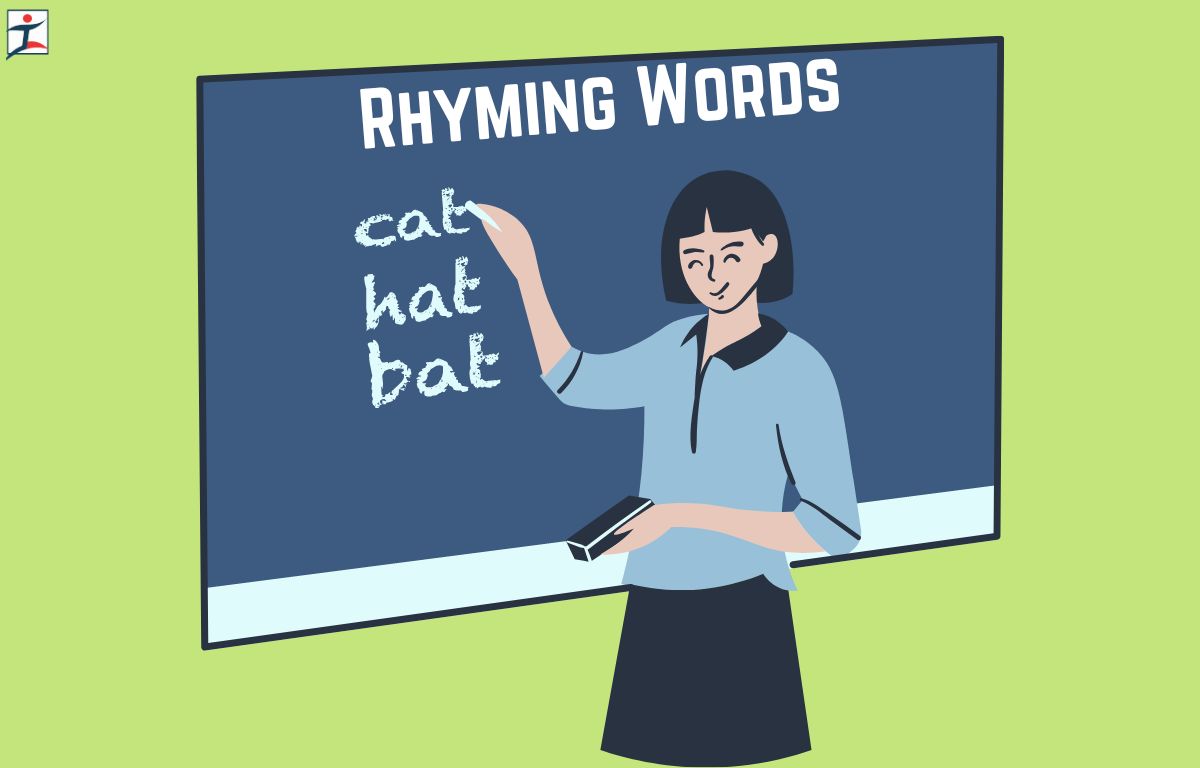Table of Contents
Have you ever noticed how some words sound alike? These are called rhyming words! Rhyming words have similar sounds at the end, making them fun to say and easy to remember. For example, “old” and “gold” rhyme because they both end with the same sound. Rhymes create a rhythm, making language more musical. We often find rhyming words in children’s books and nursery rhymes, helping kids learn new words and improve their speaking skills. In this article, we will explore some common rhyming words and see how they can be used in poems and stories.
Rhyming Words in English
Rhyming Words are words that sound similar at the end. Imagine words like “cat” and “hat” or “sun” and “fun”. When words rhyme, they have the same ending sounds, like ‘at’ in “cat” and “hat”. Rhyming is like a fun game of matching sounds! it makes poems and songs sound nice because they have a rhythm. You can try to find rhyming words by listening to how words end. For example, if you think of a word like “lake,” you can try to find words that end with the same sound, like “cake” or “snake”. It is a cool way to play with words and make stories or songs more interesting.
Rhyming Words: Fun with Sounds
“Rainbow colors, oh so bright,
Red and Yellow, such a sight!
Orange and green, they rhyme so fine,
Blue and purple, like a vine.
In the sky, after rain showers,
Rainbow brings us rhyming powers!”
What did you notice or catch your eyes or ears in the lines we just talked about? Do you love rainbows? Did you know that they can teach us about rhyming words? Let us explore this colorful adventure together!
When we look at a rainbow, we see different colors like red, yellow, orange, green, blue, and purple. Just like these colors, words can have special friends that sound the same at the end. We call these words rhyming words. In the poem mentioned above, we talked about rhyming words. Did you notice how “bright” rhymes with “sight”, and “fine” rhymes with “vine”? That’s the magic of rhyming words!
Rhyming words make poems and stories sound musical and fun. They help us remember words and make reading and listening enjoyable. So, whenever you hear words that sound alike at the end, you have found rhyming words!
Define Rhyme and Rhythm
Rhyme happens when words sound the same at the end, like “cat” and “hat.” Rhyming words make poems or songs fun to hear and easy to remember. Rhythm is like the beat in music or poetry. It’s how the sounds or words follow a pattern, like clapping hands or tapping feet to a song. Rhythm makes words flow smoothly and gives a nice feeling when you listen to them. In poetry, it helps the lines sound connected and fun to read. Together, rhyme and rhythm make poems and songs more enjoyable and catchy for everyone.
So, imagine reading a poem that goes like this:
“I have a cat,
Her name is Pat,
She wears a hat,
And sleeps on a mat.”
The words “cat”, “Pat”, “hat”, and “mat” rhyme because they sound alike at the end. And when you read it out loud, you can feel the rhythm because the words follow a steady beat.

Rhyming Words List
We have discussed a list of words that rhyme, these words will help you understand Rhyming words more easily:
- Cat – Mat – Rat – Hat – Bat – Fat – Pat – Sat – Chat – That
- Dog – Log – Frog – Bog – Jog – Smog – Clog – Hog – Catalog – Blog
- Class – Mass – Gas – Pass – Glass – Grass – Brass – Surpass
- Cook – Book – Took – Look – Hook
- Cool – School – Rule – Tool – Pool – Fool
- Cut – Hut – Shut – But – What
- Day – Way – Say – May – Stay – Ray – Bay – Clay – Decay
- Die – By – High – Why – Try – Sky – Buy – Cry – Rely – Guy
- Dirty – Thirty – Naughty – Thirsty
- Draw – Law – Saw – Jaw – Awe – Flaw – Claw – Paw
- Drop – Crop – Chop – Mop – Shop – Stop – Slope – Top – Swap
- Each – Beach – Reach – Speech – Teach
- Tree – Bee – Knee – Free – See – Flea – Key – Me – We – Glee
- Ask – Mask – Flask – Task – Bask
- About – Throughout – Drought – Without – Scout – Doubt – Sprout
- Above – Glove – Dove – Love
- Across – Loss – Cross – Toss
- Add – Glad – Sad – Mad – Lad – Dad – Bad – Had
- Age – Stage – Wage – Engage – Sage – Cage
- Air – Chair – Hair – Care – Share – Fair – Rare – Chair – Repair
- Art – Part – Start – Apart – Chart – Heart – Cart – Depart
- Boy – Joy – Toy – Enjoy – Destroy – Employ
- Lady – Shady
- Laugh – Half – Calf – Behalf – Staff – Graph
- Last – Past – Cast – Vast – Contrast – Blast
- Lock – Stock – Walk – Block – Rock – Shock – Clock – Chalk
- Right – Kite – Height – Bite – Might
- Owl – Growl – Foul
- Boat – Coat – Float – Wrote – Note – Promote – Remote – Throat – Denote – Devote
- Cave – Gave – Save – Wave – Grave – Behave – Brave – Shave – Engrave
- Hole – Mole – Stole – Control – Whole – Roll – Soul – Goal – Toll – Poll
- Hot – Not – Cot – Got – Lot – Caught – Shot – Spot – Bought – Plot – Forgot
- Education – Population – Situation – Association – Administration – Communication
- Effect – Project – Object – Direct – Respect – Select – Perfect – Reflect – Detect
- Face – Race – Maze – Gaze – Lays – Case – Place – Space – Trace – Replace – Ace
- False – Force – Source – Across – Resource – Horse – Boss
- Father – Honour – Scholar – Proper – Dollar – Brother – Taller
- Fault – Salt – Default – Vault – Assault
- Fox – Box – Ox – Stocks – Socks – Flocks
- Funny – Money – Honey – Sunny – Bunny
- Future – Fewer – User – Newer – Humour – Cooper – Ruler
- Game – Same – Came – Name – Frame – Aim – Became – Shame – Lame
- Gate – State – Great – Rate – Weight – Date – Eight – Straight – Plate
- Gift – Shift – Lift – Drift – Skit – Thrift
- God – Odd – Nod – Squad
Different Uses of Rhyming Words
These are just a few examples, and the uses of rhyming words can vary widely depending on the purpose of communication.
- Poetry: Rhyming is commonly used in poetry to create rhythm, emphasize key ideas, and enhance the overall aesthetic appeal of the poem.
- Songwriting: Rhymes are essential in song lyrics to maintain flow, create memorable hooks, and convey emotions effectively.
- Children’s Literature: Rhymes are often used in children’s books and nursery rhymes to aid in language development, make stories engaging, and promote memorization.
- Advertising and Slogans: Rhymes are frequently used in advertising slogans and jingles to make them catchy and easy to remember.
- Speeches and Presentations: Rhymes can be used in speeches and presentations to add emphasis, make points memorable, and capture the audience’s attention.
- Creative Writing: In fiction and creative writing, rhymes can be used to create playful or whimsical effects, convey a character’s voice, or enhance dialogues.
Some Fun Activities with Rhyming Words
These activities can be great for building phonemic awareness and language skills in a fun and engaging way!
- Rhyming Bingo: Create bingo cards with pictures or words. Call out a word, and players cover the rhyming word on their cards.
- Rhyming Pairs Memory Game: Create pairs of cards with rhyming words. Players take turns flipping two cards to find matching rhyming pairs.
- Rhyming Word Sort: Write a variety of words on cards and have children sort them into groups based on rhymes.
- Rhyme-a-Story: Create a story where every line has to end with a rhyming word. This can be done as a collaborative activity, with each person adding a new rhyming line.
- Rhyme Detective: Read a rhyming book and ask children to listen carefully and identify the rhyming words.
- Rhyming Charades: Act out a word without speaking, and others guess the word by thinking of rhymes with a given clue.
- Rhyming Relay: Divide into teams. Each team has to come up with as many rhyming words as possible in a set time. The team with the most words wins.
- Rhyme Time Scavenger Hunt: Give children a list of words and have them find objects around the house or classroom that rhyme with those words.
Same Sound Words
You must have heard of words that sound the same, these same-sounding words are called Homophones. These homophones sound the same but have different meanings and spellings. For example, ‘Pair’ means two things together, while ‘pear’ is a fruit. Another example is ‘sun’ (in the sky) and ‘son’ (a boy child). It is important to listen carefully to understand their meaning when speaking and learn their spellings when writing to avoid confusion. Some Same Sound Words are given below:
Common Homophones:
- Air – Heir
- Bare – Bear
- Be – Bee
- Blue – Blew
- Buy – By – Bye
- Cell – Sell
- Cent – Scent – Sent
- Die – Dye
- Fair – Fare
- Flour – Flower
- For – Four
- Hear – Here
- Hole – Whole
- Hour – Our
- Knight – Night
- Know – No
- Mail – Male
- Meat – Meet
- One – Won
- Pair – Pear – Pare
- Peace – Piece
- Plain – Plane
- Right – Write – Rite
- Rose – Rows
- Sea – See
- Son – Sun
- Tail – Tale
- Their – There – They’re
- To – Two – Too
- Wait – Weight
- Way – Weigh
- Weak – Week
- Weather – Whether
- Wood – Would







 Essay Writing Format for Students in Eng...
Essay Writing Format for Students in Eng...
 Essay on My Best Friend, 10 Lines, 100, ...
Essay on My Best Friend, 10 Lines, 100, ...
 Essay on Pollution for Students and Chil...
Essay on Pollution for Students and Chil...




















